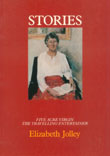

Courtesy of Fremantle Press
Decades of Debate
Jolley's career in writing divides rather neatly into two periods:
an initial twenty years or so, the 1960s/1970s, during which she slowly
found her way into print as a short-story and radio-play writer, followed
by more than two decades during which she established an inter/national
reputation as one of Australia's most important novelists. This division
reflects, not simply the “natural” progression of one writer's
career, but also the shaping forces of the institutionalised forms and
practices of literary production and reception in a particular time and
place. Those shaping forces can be glimpsed by considering the vigorous
debates about the nature of Australian literature conducted since Federation
in publishing houses, universities, literary journals, the media, and
like institutions.
In “Literary Canons and Literary Institutions,” Paul Carter
identifies an initial period of debate, lasting from the 1890s through
the 1930s, during which a national(ist) literature was established, but
only in a weak form, in so far as Australian literature largely was regarded
as a regional variety of English literature. He then distinguishes three
stages in Australia's post-war literary debate: the 1940s/1950s,
when an older nationalist tradition found new emphases through the activities
of writers and intellectuals; the 1950s/1960s, when this intellectual
cadre was displaced by university-based professionals who, applying the
twin criteria of literary excellence and Australian-ness, constructed
a “new” literary canon; and, finally, the 1980s/1990s, when
this reformulated canon gave way to dominant practices of anti-canonical
readings inspired by feminist and Aboriginal liberationist movements,
by governmental constructions of a multi-cultural society, and by the
tertiary sector's embrace of theory in general and feminist, post-colonial
and post-structuralist theories in particular.
Carter's analysis is potent, and it certainly relates to Jolley's
struggling across the 1960s/1970s to be published in Australia, as well
as to the remarkable reception her writing found in the eighties, that
period that Bob White, in a review of The Macmillan Anthology of Australian
Literature, called the “coming of age” of Australian literature,
but which might be more soberly described as another major shift in the
discourses and institutional structures that establish our understandings
of a national literature. Still, gone missing in Carter's analysis
is an entire decade: the 1970s. And yet that decade was critical to Elizabeth
Jolley's career in writing.